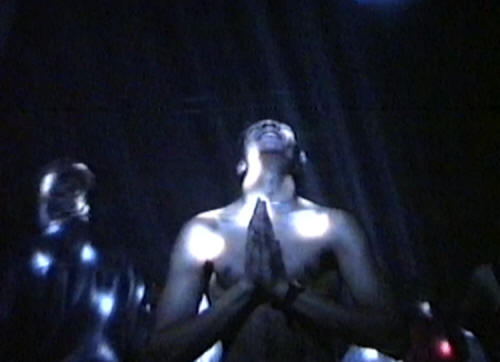|
And then
the weekend comes Gordon
Dalton responds to the work of Plymouth-based artist, Carl Slater
 The
lows are really low. If you’re lucky, you’ll get to Tuesday, possibly
Wednesday, before your world, your life, seems to fall out from beneath
you. You can be stood at work on a production line, staring at a screen
or stood in the queue for the post office, football or the dole queue.
You can try and drink through it. The decline has been gradual because
the pills were quality, but now, your God has punched you in the stomach
and left a hole right through you, which spins you off your already
fragile axis and sends you tumbling into despair. The
lows are really low. If you’re lucky, you’ll get to Tuesday, possibly
Wednesday, before your world, your life, seems to fall out from beneath
you. You can be stood at work on a production line, staring at a screen
or stood in the queue for the post office, football or the dole queue.
You can try and drink through it. The decline has been gradual because
the pills were quality, but now, your God has punched you in the stomach
and left a hole right through you, which spins you off your already
fragile axis and sends you tumbling into despair.
But before that, it’s all about the anticipation of the rush. If you’re
lucky it will begin Friday morning, possibly Thursday before your world,
your life starts to have meaning again. The pills might be dodgy but
you’re hoping for that mad rush. It starts in that hole in your stomach
and rises through your body like red hot electricity in your veins,
pumping in your forehead spinning you off your increasingly confident
axis and into a blissful, sweaty, gurning, fist pumping, feet stomping,
loved up state of euphoria.
The history of dance culture is constantly evolving and being rewritten.
The work of Carl Slater sits somewhere in the footnotes, in the
underground, exploring and expanding the archives, somewhere between the
anticipation of ecstatic euphoria and the crashing comedown.
Slater is 35. Born in 1981, he missed both the explosion of dance
culture in the mid to late eighties as well as what he Slater describes
‘the golden age’ of techno and rave. He excavates this modern history,
making a folk archive of its imagery, subcultures, politics and
drug-ridden experiences, where little pills with an encyclopaedia of
names surreptitiously swapped hands in pubs and openly, joyfully,
swapped between tongues in clubs, warehouses and fields.
Slater mixes in his own late 90's clubbing experiences with a rich seam
of UK club culture, which has a very different feel to its US origins
and very different again to 90s American club culture. Provincial towns
across the UK all had their own unique scenes, which felt part, for the
weekend at least, to be connected through the drugs and driving around
looking for the next dancefloor. This communal culture is critically
celebrated in Slater’s work, where the vagaries the football terrace and
the factory floor were forgotten in favour of a pill.
A throbbing bass line and sensory overload runs throughout his work, but
it is removed or half remembered, a muddy memory of Saturday night. The
smell of Vicks (used to enhance and prolong the buzz of ecstasy) hangs
in the air. Your retinas burn with day glo and op art illusions, so
clichéd, yet so true. Slater gives his fastidiously edited films,
objects and paraphernalia iconic status.
Church-like installations place you somewhere between the pulpit and the
pew, both preacher and preached to. Curtains are draped open like
confession boxes or the faded glory of town centre discos turned into
clubs, where sticky worn carpets and velvet curtains fail to give off
VIP velvet-roped vibes.
Archive footage shows the crowd move as one, slowed down in the strobe
lights. This isn’t fashionable or a passing fad, this is religious
fervour, a communal confession that life is a constant disappointment
other than for that mad rush of ecstasy. This is real participation,
real community spirit, not some in this together, socially engaged big
society.
Everyone around you feels the same. All of your friends, all of your new
friends and all of your new friends’ new friends and what seems like
everybody up and down the UK with their hands in the air. All back to
mine to laugh and love and hug each other and do it the next night and
the night after and the night after trying to put off that mundane slide
towards that punch in the stomach. But right now. You are God. We are
all Gods.
And then the low hits you. When the sermon is over and you have left all
your confessions out there, the last pill of communion has worn off. You
are back on the factory floor or staring at a screen. What is left, what
was there all the time and is now plain to see, is fear. Not love, but
paranoia, fear and loathing.
And then the weekend comes.
Gordon Dalton is an artist
www.gordondalton.co.uk
and Network Manager for Visual Art South West
www.vasw.org.uk
Carl Slater was at
G|39 Cardiff 23/7/16-20/8/16 with 'Miss America's trip to
Technoland' see
'webprojects' for
hyper.crucible |

